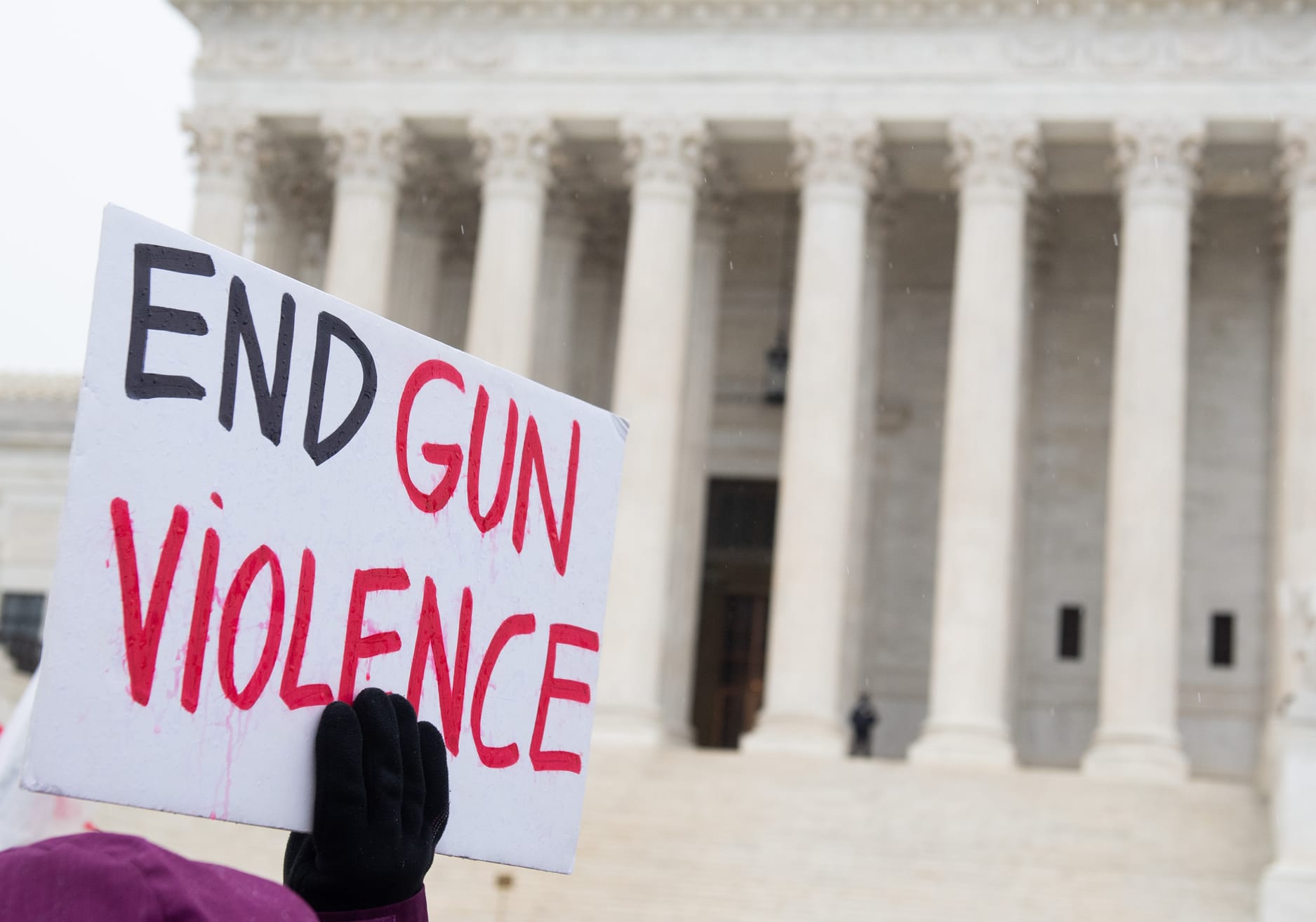
Empowering Americans to Fight the Gun Lobby in Court
The gun industry enjoys unprecedented legal immunity. The culprit? Congress.
In 2005, Congress passed the Protection of Lawful Commerce in Arms Act (PLCAA), giving into gun lobby demands by making it nearly impossible to sue gun manufacturers—even those that market military-grade weapons to civilians.
Our litigation team fights tirelessly to chip away at manufacturers’ undue influence and empower everyday Americans to speak out against bad actors in the industry. In recent weeks, Giffords Law Center filed two amicus, or “friend of the court” briefs, to continue this mission.
Empowering Survivors
On July 1, 1993, a man armed with three handguns—two of which were assault pistols fitted with “hellfire triggers”—walked into the law offices of Pettit & Martin at 101 California St. in San Francisco. He then went on a murderous rampage that ended with eight people dead and six injured. Survivors of this tragic mass shooting later founded the Legal Community Against Violence, the organization today known as Giffords Law Center to Prevent Gun Violence. The group’s advocacy fueled the fight to pass the former federal assault weapons ban and led states, including California, to strengthen restrictions on military-grade weapons.
In 2017, the NRA brought a lawsuit against the California Assault Weapons Control Act, seeking to undo survivors’ progress and market assault weapons in the state. The case, Rupp v. Becerra, is now on appeal, and on June 2, 2020, we joined with survivors of the 101 California shooting to file an amicus brief. The brief tells the stories of survivors who lost spouses, friends, and colleagues, illustrating the enormous harm these weapons wreak upon individuals, families, and communities.
Stories like that of Michelle Scully Hobus, who was visiting her husband John Scully, a young lawyer at Pettit & Martin, when the gunman stormed into the building. She was shot and ultimately recovered, but her husband was killed protecting her, using his body to shield her own.
In the brief, Michelle describes the tragic ripple effects of July 1, 1993. “The effect didn’t stop at the eight people who died, or those who were there and survived,” Michelle said. “It was exponential.”
Chuck Ehrlich, a senior partner at Pettit & Martin, and Cam Baker, managing partner, helped co-found the Legal Community Against Violence. Chuck echoed Michelle’s sentiments about the trauma and devastation caused by the shooting:
“It’s like throwing a rock in a pond. The ramifications ripple outward.”
These survivors are committed to bringing about an America where no one else has to endure what they lived through, and where peaceful communities are more important than gun lobby profits. Our brief tells their stories in order to make the case that courts must consider the loss and trauma of survivors and communities, and recognize survivors’ rights to participate in our democracy by advocating for gun safety laws after a tragedy.
Empowering Law-Abiding Gun Owners
On October 1, 2017, a gunman armed with multiple AR-15 assault rifles modified with bump stocks unleashed a torrent of gunfire on a crowd of concert-goers in Las Vegas, Nevada. Over the course of ten minutes, he killed 58 people and hit 422 people with bullets or shrapnel. Additionally, more than 400 people were injured in the ensuing chaos.
In response to this shooting, the worst in modern American history, the Bureau of Alcohol, Tobacco, and Firearms (ATF) ruled that the term “machine gun” encompasses bump stocks, and gave owners of bump stocks 90 days to either destroy or surrender their bump stocks to the ATF. A coalition of bump stock sellers and purchasers challenged the ATF’s rule under the Takings Clause of the Fifth Amendment, which requires “just compensation” if private property is taken for public use.
In early June, we filed a brief on behalf of 19 gun owners who support reasonable gun safety laws in the case Modern Sportsman v. United States. These gun owners argue that any responsible gun owner or seller was aware that bump stocks existed to exploit a regulatory loophole in the machine gun ban, and shouldn’t have been surprised that the government acted to close this loophole.
In fact, many bump stock purchasers and sellers were well aware that bump stocks were likely targets for regulation in the wake of the Las Vegas shooting. After the ATF rule was proposed, RW Arms, one of the plaintiffs that is now seeking $20 million in compensation for bump stocks, sent out promotional emails encouraging customers to buy bump stocks to “enjoy this unique firing experience” while they still could, and put a countdown timer on their website tracking the “days, hours, minutes and seconds” until they would no longer be permitted to sell bump stocks.
The Takings Clause analysis used by courts considers whether plaintiffs could have “reasonably anticipated” the possibility of regulation. It also considers precedent showing that the Takings Clause applies when property is taken for government use—not when products are banned because they endanger the public. The gun owners’ brief argues that since responsible gun owners and sellers anticipated bump stocks would be banned to protect public safety, the court should reject the Takings Clause challenge.
Together, We Can Hold the Gun Lobby Accountable
Decades apart, the 101 California St. and Route 91 massacres inspired changes in federal and state laws. In the year following the shooting at 101 California, survivors testified in support of the 1994 federal assault weapons ban, and many continue their advocacy to this day. After the Route 91 shooting in Las Vegas, the ATF banned bump stocks, as did 11 states and DC.
Now regulations intended to prevent massacres like these from happening again are under attack from the gun lobby. We’re committed to keeping up the fight to defend these laws from reckless campaigns against gun safety, and to empowering all Americans—from survivors to law-abiding gun owners—to join in this fight with us.